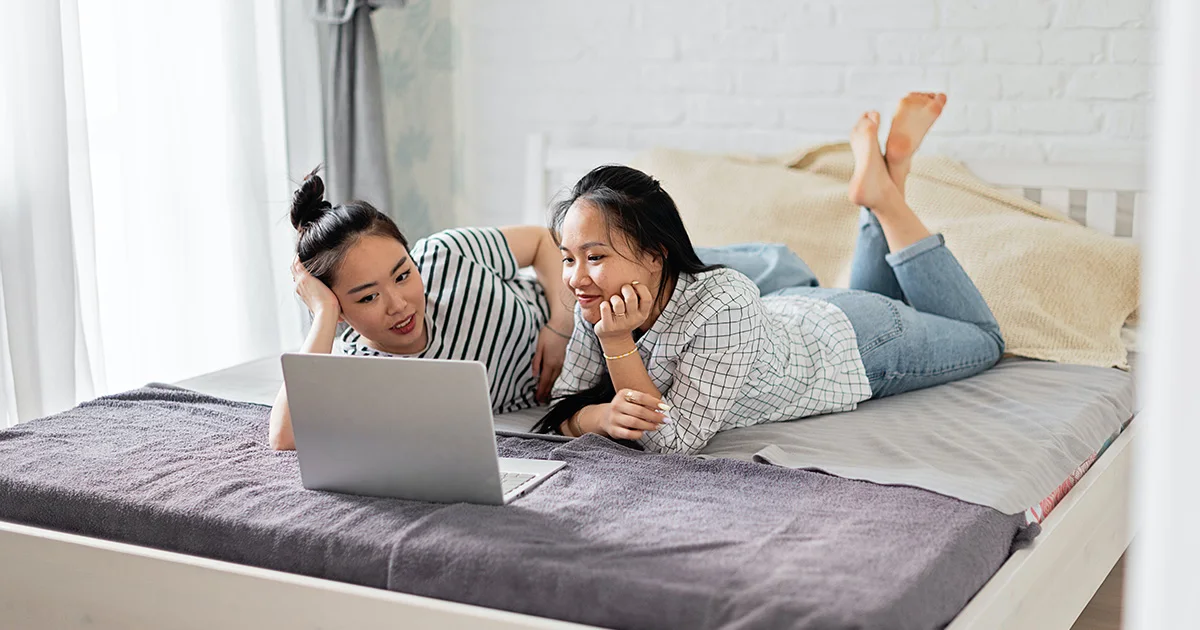Key takeaways
While sleeping naked doesn’t directly lead to weight loss, it can improve sleep quality, which can have an impact on weight loss.
Sleeping naked may help regulate your core body temperature, personal comfort, and hormone levels, which can all improve sleep quality.
Here's what we'll cover
Here's what we'll cover
Key takeaways
While sleeping naked doesn’t directly lead to weight loss, it can improve sleep quality, which can have an impact on weight loss.
Sleeping naked may help regulate your core body temperature, personal comfort, and hormone levels, which can all improve sleep quality.
If you think trouble sleeping is a minor problem, think again.
Getting a good night’s sleep on a regular basis can boost your mood, memory, and even your weight loss efforts. People who sleep better tend to experience more weight and fat loss.
Where does sleeping naked enter the picture? Part of our circadian rhythm involves the natural rises and falls in our core body temperature — when our temperature falls, we feel sleepy, and when it rises, we feel awake. Your bedroom temperature can either facilitate this natural drop in temperature or make it more challenging, and what you wear (or don’t wear) can matter as well.
So, could sleeping naked help with weight loss? It just might.
Does sleeping naked help you lose weight?
Before you get too excited, let’s set some expectations. Sleeping naked does not necessarily help with weight loss directly. Instead, sleeping naked may improve your sleep quality, which could potentially help.
Poor sleep — whether you sleep too much, too little, or too restlessly — is linked to obesity, overeating, and weight gain. On the other hand, those who get a good night’s sleep (around 7–9 hours of sound sleep through the night) lose more weight when dieting and exercising. And, people who sleep better during their weight loss journey tend to have more success losing weight. In one study of people following a diet and exercise plan, those who slept better (e.g. spent more time in bed actually asleep, and less time restlessly awake) lost more weight.
Having said that, your skin plays a major role in enabling the transfer of body heat that helps you drift off to sleep. Even small changes in your skin temperature can reduce sleep latency, or the amount of time it takes you to fall asleep. So, having fewer barriers between your skin and the ambient room temperature — while still using bedding and covers to keep yourself comfortable — may in theory help you sleep better.
Let’s take a deeper look at the potential weight-related benefits of sleeping naked.
Better temperature regulation
The strongest argument for sleeping naked is that it allows your body to regulate your core temperature during sleep better, resulting in more restful sleep. Several studies have found that your bedroom temperature plays a role in the quality of your sleep. In one small study conducted in Australia, the higher the bedroom temperature, the lower the sleep efficiency (the amount of time you spend asleep in bed), and the less time spent in essential rapid eye movement (REM) sleep.
In another study, increasing the bedroom temperature by 6°F on elderly subjects (3°C) reduced a person’s sleep time by almost half an hour. If you’re wondering if removing your PJs can really make that much of a difference, it could. Even a small increase in heat can activate your sympathetic nervous system and increase skin temperature, lowering sleep quality. On the flip side, lowering the thermostat and improving your bedroom’s ventilation, perhaps by using a fan, could help improve sleep.
Increased comfort, both physically and emotionally
Wearing too many layers while you sleep can disrupt your comfort and ability to sleep through the night. But, you also don’t want to feel too cold, as that can disrupt your sleep, too. It’s a classic Goldilocks scenario.
Sleeping naked can help some people find that “just right” feeling, with the help of your bedding, of course. If you feel too chilly, throw on a pair of socks to help your extremities stay warm. In one small study conducted in Korea, sleep socks, which are softer and looser than everyday socks, have been shown to help people fall asleep faster and sleep over 30 minutes longer, with fewer awakenings throughout the night.
If you sleep with a partner, sleeping naked offers the added benefit of more skin-to-skin contact. Studies of mammals show that touch, including affectionate touch, boosts oxytocin and strengthens relationships. Sleeping next to someone can help you feel more secure, on both a physical and emotional level, providing comfort and enabling you to sleep deeper and longer.
More balanced hormones
When you don’t sleep well, it messes with your hormone levels, including your appetite hormones. Poor sleep tends to boost levels of ghrelin, the hunger hormone, while lowering leptin, the satiety hormone. Poor sleep also increases levels of cortisol, the stress hormone. With more stress, less rest, and increased hunger, people tend to eat more to boost their mood and energy levels—stunting weight loss efforts and making it even harder to stick to a diet.
But when you sleep well, it’s easier for your hormones to stay in balance — so you’re more likely to eat when you actually feel hungry, instead of just fatigued or stressed out.
More health benefits of sleeping naked
There may be even more health benefits to sleeping naked, outside of weight loss.
Improved body image and self-esteem
Studies have found that spending time naked with other people in non-intimate settings can bolster one's body image and self-esteem. Researchers think that seeing everyday human bodies in real life helps one appreciate one's own body more and have less anxiety about how one looks.
Feeling good about yourself can make you feel more motivated to stick to your goals, weight-related or otherwise. Plus, feeling better about yourself may help improve symptoms of depression, which is heavily associated with sleep disturbances.
More intimacy
If you sleep with a partner, going to bed without your clothes on may lead to more intimacy. After all, the first step is already taken.
Increased intimacy has its obvious benefits, but research also shows it helps you sleep better. Both intercourse and masturbation can lower cortisol (the stress hormone) while boosting oxytocin. Both activities have been shown to help people fall asleep faster and experience better sleep overall, too.
Increased fertility (for men)
If you’re hoping to have children, sleeping naked offers yet another benefit besides increased intimacy.
Higher scrotal temperatures can negatively affect testicular function. Studies have found that men who wear more breathable boxers, as opposed to tighter underwear like boxer briefs, might have higher sperm concentration and overall sperm counts. So, wearing looser underwear when you sleep—or no underwear at all—could help improve sperm count in men.
Frequently asked questions
What position should I sleep in to lose belly fat?
You can’t really force yourself to lose weight in a specific spot. But, simply sleeping better in general can help with fat loss, including belly fat. In a two-week study of people who were on a diet, those who got a healthy amount of sleep lost more fat than those who got less sleep. And in a year-long study, better sleepers enjoyed both more weight and fat loss than poorer sleepers.
However, if you’re looking for the best sleeping position from a sleep quality perspective, a small study has shown that people who sleep on their side, particularly their right side, tend to sleep better than those who sleep on their back or stomach. Of course, it’s hard to generalize the results of small studies and it’s important for you to sleep in the position that’s most comfortable for you while keeping any limitations, such as recent surgeries or injuries, in mind.
What might help you lose weight while you sleep?
While these methods haven’t been studied, they might help to make your sleep as deep and as restful as possible. Whether or not you feel like sleeping naked, you can follow these sleep hygiene tips for higher-quality sleep:
Turn your thermostat to a cool, comfortable setting and use a fan, if possible
Wind down with a nightly bedtime routine
Follow a regular sleep schedule, with room for 7–9 hours of sleep per night
Stay away from screens in the 30–60 minutes before bed
Meditate or perform relaxation exercises before going to sleep
Is sleep deprivation good for losing weight?
No. It’s actually the reverse, with adults who regularly get less than 7 hours of sleep experiencing higher rates of obesity. Restricting your sleep for just a handful of days can lead to weight gain.
Sleep deprivation is linked to not only eating more in general, but eating lower-quality foods (more energy-dense, sugary, and fatty foods and less fruits and vegetables) and poorer eating habits (more snacks and late-night eating). In turn, this kind of diet can worsen your sleep quality. Sleep deprivation can increase your cortisol and ghrelin hormones, so if you’ve ever found yourself feeling stressed and hungry after a poor night’s sleep, there is a biological explanation.
Getting a good night’s sleep might also help you keep up with your exercise routine. When you don’t get enough sleep, you can feel too tired to work out, which can interfere with your weight loss efforts. Plus, engaging in exercise can help you sleep more deeply, which can contribute to better overall health.
DISCLAIMER
If you have any medical questions or concerns, please talk to your healthcare provider. The articles on Health Guide are underpinned by peer-reviewed research and information drawn from medical societies and governmental agencies. However, they are not a substitute for professional medical advice, diagnosis, or treatment.
Chimed-Ochir, O., Ando, S., Murakami, S., et al. (2021). Perception of feeling cold in the bedroom and sleep quality. Nagoya Journal of Medical Science, 83(4), 705–714. doi:10.18999/nagjms.83.4.705. Retrieved from https://www.ncbi.nlm.nih.gov/pmc/articles/PMC8648527/=
Cooper, C. B., Neufeld, E. V., Dolezal, B. A., et al. (2018). Sleep deprivation and obesity in adults: a brief narrative review. BMJ Open Sport & Exercise Medicine, 4(1), e000392. doi:10.1136/bmjsem-2018-000392. Retrieved from https://www.ncbi.nlm.nih.gov/pmc/articles/PMC6196958/
Creasy, S. A., Ostendorf, D. M., Blankenship, J. M., et al. (2022). Effect of sleep on weight loss and adherence to diet and physical activity recommendations during an 18-month behavioral weight loss intervention. International Journal of Obesity (2005), 46(8), 1510–1517. doi:10.1038/s41366-022-01141-z. Retrieved from https://www.ncbi.nlm.nih.gov/pmc/articles/PMC9850430/
Fang, H., Tu, S., Sheng, J., et al. (2019). Depression in sleep disturbance: A review on a bidirectional relationship, mechanisms and treatment. Journal of Cellular and Molecular Medicine, 23(4), 2324–2332. doi:10.1111/jcmm.14170. Retrieved from https://www.ncbi.nlm.nih.gov/pmc/articles/PMC6433686/
Harding, E. C., Franks, N. P., & Wisden, W. (2019). The Temperature Dependence of Sleep. Frontiers in Neuroscience, 13, 336. doi:10.3389/fnins.2019.00336. Retrieved from https://www.ncbi.nlm.nih.gov/pmc/articles/PMC6491889/
Kline, C. E., Chasens, E. R., Bizhanova, Z., et al. (2021). The association between sleep health and weight change during a 12-month behavioral weight loss intervention. International Journal of Obesity (2005), 45(3), 639–649. doi:10.1038/s41366-020-00728-8. Retrieved from https://www.ncbi.nlm.nih.gov/pmc/articles/PMC7914147/
Ko, Y. & Lee, J. Y. (2018). Effects of feet warming using bed socks on sleep quality and thermoregulatory responses in a cool environment. Journal of Physiological Anthropology, 37(1), 13. doi:10.1186/s40101-018-0172-z. Retrieved from https://www.ncbi.nlm.nih.gov/pmc/articles/PMC5921564/
Mínguez-Alarcón, L., Gaskins, A. J., Chiu, Y. H., et al. (2018). Type of underwear worn and markers of testicular function among men attending a fertility center. Human Reproduction (Oxford, England), 33(9), 1749–1756. doi:10.1093/humrep/dey259. Retrieved from https://www.ncbi.nlm.nih.gov/pmc/articles/PMC6530653/
Okamoto-Mizuno, K. & Mizuno, K. (2012). Effects of thermal environment on sleep and circadian rhythm. Journal of Physiological Anthropology, 31(1), 14. doi:10.1186/1880-6805-31-14. Retrieved from https://www.ncbi.nlm.nih.gov/pmc/articles/PMC3427038/
Papatriantafyllou, E., Efthymiou, D., Zoumbaneas, E., et al. (2022). Sleep Deprivation: Effects on Weight Loss and Weight Loss Maintenance. Nutrients, 14(8), 1549. doi:10.3390/nu14081549. Retrieved from https://www.ncbi.nlm.nih.gov/pmc/articles/PMC9031614/
Schneiderman, I., Zagoory-Sharon, O., Leckman, J. F., et al. (2012). Oxytocin during the initial stages of romantic attachment: relations to couples' interactive reciprocity. Psychoneuroendocrinology, 37(8), 1277–1285. doi:10.1016/j.psyneuen.2011.12.021. Retrieved from https://www.ncbi.nlm.nih.gov/pmc/articles/PMC3936960/
Sprajcer, M., O'Mullan, C., Reynolds, A., et al. (2022). Sleeping together: understanding the association between relationship type, sexual activity, and sleep. Sleep Science (Sao Paulo, Brazil), 15(Spec 1), 80–88. doi:10.5935/1984-0063.20220005. Retrieved from https://www.ncbi.nlm.nih.gov/pmc/articles/PMC8889988/
West, K. (2017). Naked and Unashamed: Investigations and applications of the effects of naturist activities on body image, Self-Esteem, and life satisfaction. Journal of Happiness Studies, 19(3), 677–697. doi:10.1007/s10902-017-9846-1. Retrieved from https://link.springer.com/article/10.1007/s10902-017-9846-1
West, K. (2021). I Feel Better Naked: Communal Naked Activity Increases Body Appreciation by Reducing Social Physique Anxiety. Journal of Sex Research, 58(8), 958–966. doi:10.1080/00224499.2020.1764470. Retrieved from https://pubmed.ncbi.nlm.nih.gov/32500740/
Xiong, J., Lan, L., Lian, Z., et al. (2020). Associations of bedroom temperature and ventilation with sleep quality. Science and Technology for the Built Environment, 26(9), 1274–1284. doi:10.1080/23744731.2020.1756664. Retrieved from https://www.tandfonline.com/doi/abs/10.1080/23744731.2020.1756664
Yan, Y., Zhang, H., Kang, M., et al. (2022). Experimental study of the negative effects of raised bedroom temperature and reduced ventilation on the sleep quality of elderly subjects. Indoor Air, 32(11), e13159. doi:10.1111/ina.13159. Retrieved from https://pubmed.ncbi.nlm.nih.gov/36437666/
Zhang, Y., Xiao, A., Zheng, T., et al. (2022). The Relationship between Sleeping Position and Sleep Quality: A Flexible Sensor-Based Study. Sensors (Basel, Switzerland), 22(16), 6220. doi:10.3390/s22166220. Retrieved from https://www.ncbi.nlm.nih.gov/pmc/articles/PMC9416198/













